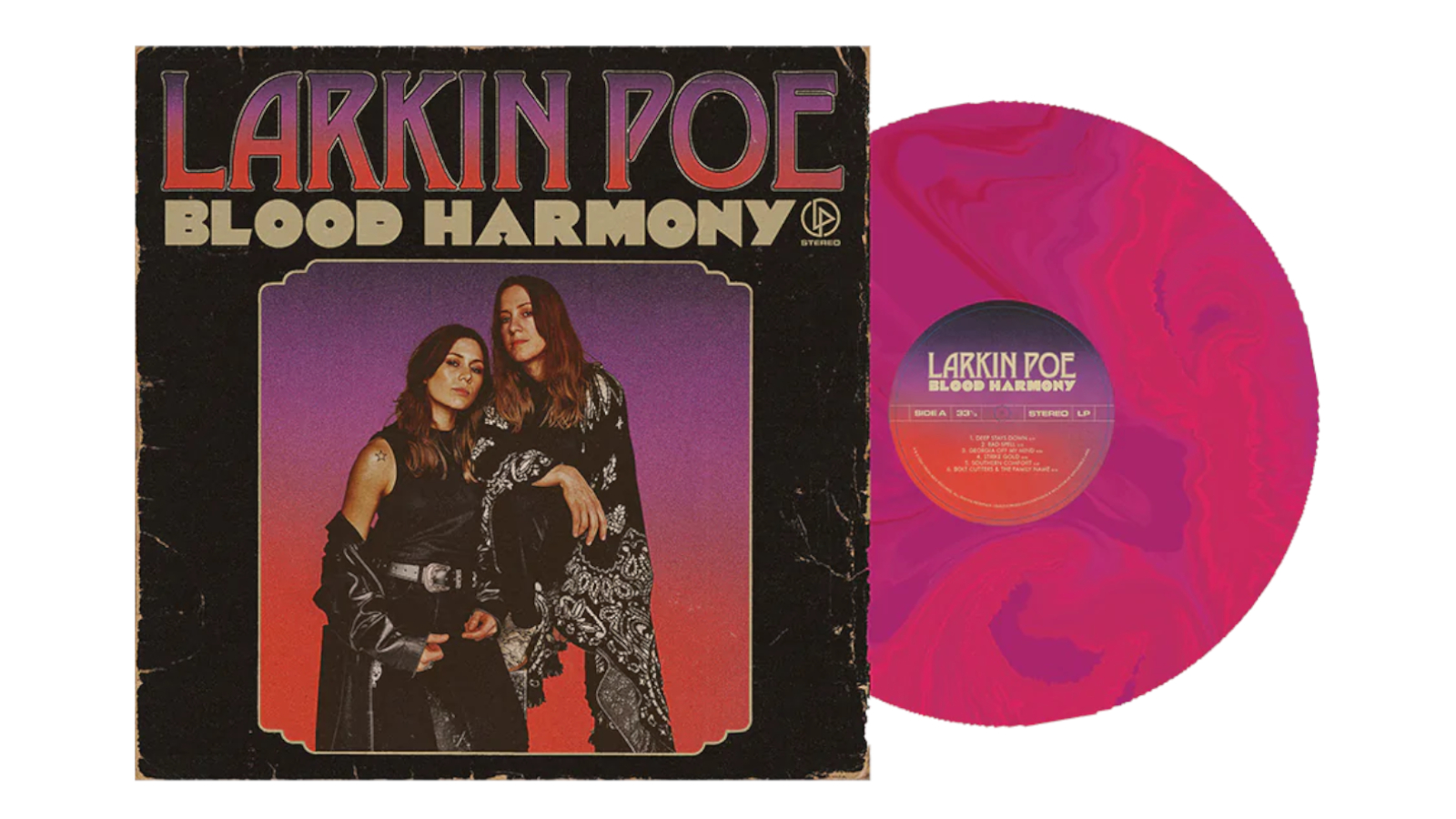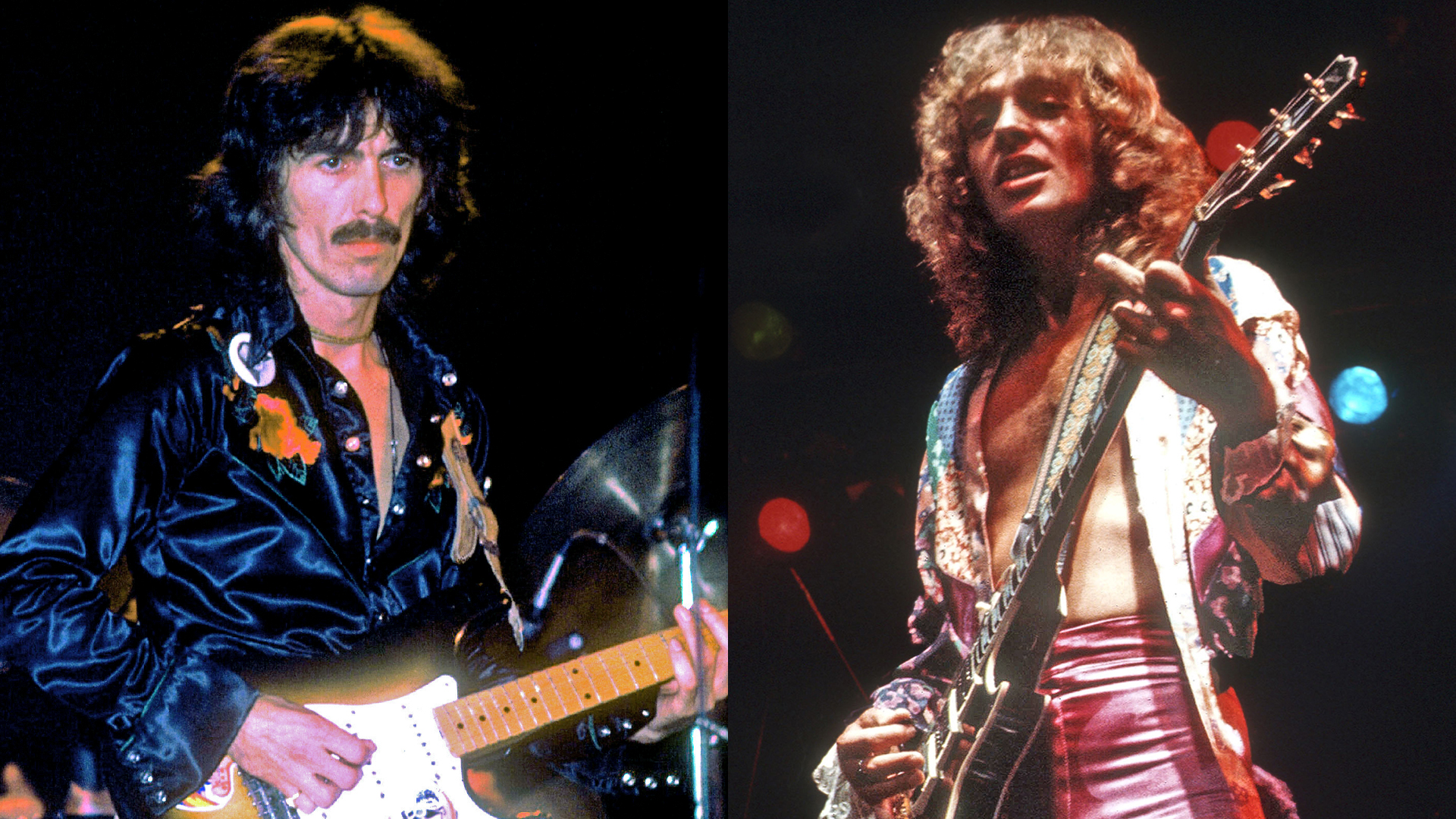"We Let It Be the Raw Components of Who We Are as a Rock Band": Larkin Poe Talk Recording Their Blues-Infused Rock 'n' Roll Album, ‘Blood Harmony’
Dynamic duo Rebecca and Megan Lovell channel live energy with fuzz guitars and lap steel

There are early wake-up calls, and then there are mornings you’re too jet lagged to sleep a wink, anyway.
Add an airline losing your guitars and you have the first day of Larkin Poe’s European tour in advance of their new, sixth album, Blood Harmony (Tricki-Woo).
After landing in Hamburg, Germany, from a transatlantic flight, following a run of gigs in Canada, sisters Rebecca and Megan Lovell discovered their guitars didn’t arrive with them.
They made an attempt to sleep but returned to the airport early in the morning and spent the next three hours “shaking the airport down from tip to tail,” Rebecca says, so they could play on German TV before the gig on the evening of our interview.

Fortunately – and perhaps ingeniously – the Lovells knew their gear was somewhere in the airport because the electronic trackers they stuck inside their guitar cases led them there.
Finally, past an empty terminal, they found a warehouse full of luggage, and around another wall, their lost guitars.
“We actually did a social media post yesterday to have some backups,” Rebecca says. “And – god bless all of the incredible supportive people in our network – we had a lap steel and some guitars lined up if we didn’t get our things back.”
All the latest guitar news, interviews, lessons, reviews, deals and more, direct to your inbox!
As anyone who has followed Larkin Poe knows, the Lovells bring that same determination to creating their blues-heavy southern rock, producing their albums and releasing them on their own label.
But after the meticulously crafted songs on 2020’s Self Made Man, they were determined to make Blood Harmony sound like their live performances.
The band enlisted Rebecca’s husband, Tyler Bryant, on loan from his band the Shakedown, to co-produce.
Out went the gratuitous overdubs, and in came a back-to-basics approach as they recorded live with their touring band in a room.
As the Lovells rested for their TV moment, they let us in on their call-and-response guitar arrangements and the story behind Blood Harmony.
You both sound recharged on Blood Harmony. What lit that fire?
REBECCA I feel like the “fire” is a culmination of so many years making records that we felt were “almost there,” and the intrinsic desire of being a songwriter and recording artist and wanting everything to line up.
Megan and I self-produced our last four albums, and I feel like with each project we’ve gotten closer and closer to what we want. I really feel that of all the albums we’ve made, this one has come closest to having all of the t’s crossed and i’s dotted.
It was all very much live. We didn’t piece things together. It was kind of raw
Megan Lovell
It’s a really spontaneous and vibrant record, especially compared to some of the more methodically produced albums we’ve made.
MEGAN We’ve been learning a lot as producers. On past albums, we’ve pretty much played all of the instruments on the record, and Rebecca’s programmed the drums. While I love that sound, it has its limitations, and this time we knew we wanted to bring in live drums.
We knew we wanted to make it sound a little bit more like how we are live. We wanted to try and replicate some of that energy, and I think we did accomplish that. It was all very much live. We didn’t piece things together. It was kind of raw.

REBECCA I think, additionally, not double-stacking guitar was part of it. It’s such a temptation when you’re making a rock record to have the left and right wide pan, and when the chorus hits, boom! – there’s all that energy.
But I think we were very restrictive of ourselves in maintaining how we sound live, and so we didn’t double-stack guitars. We let it be the raw components of who we are as a rock band – very stripped back.
When you resist the temptation to overdub, how does that affect the way you play? Are you trying to cover what you would do over multiple parts in one take?
We were very restrictive of ourselves in maintaining how we sound live
Rebecca Lovell
MEGAN I think it was really interesting how much pre-production had an impact on how we recorded, because we did really want to put a lot of time in on the front half of the recording process, which is the writing and the pre-production – thinking things through.
Rebecca and I sat together in my basement day after day and went through the songs with a fine-tooth comb. We also performed them just as a duo because we wanted the songs to be good enough to stand on their own two legs, without production.
Rebecca and I think when you build it from the ground up – if the songs inherently have their own dynamics, if your verses sit at a certain register and then you have a blooming of a chorus – you don’t necessarily even need new elements to enter to spice it up if, in fact, the song itself is spicy and delicious.

I think that in the amount of time we spend playing, just the two of us, we organically develop guitar parts that are complementary to one another.
It’s funny: We have not only been in bands together for 15 years but we’ve also traveled as side musicians. So we’re sort of a dynamic duo to each other in knowing how to work around each other musically.
Were there moments in pre-production where the magic happened and you worked out something that surprised you?
REBECCA I think the track “Kick the Blues” features some really interesting call-and-response between the two of us.
Typically, when people listen to the album, I am panned to the left and Megan is always panned to the right, and so people can focus on the two guitar parts. You’ll hear how they correspond and intermingle.
MEGAN I think a fun example of us really just hammering away at it during pre-production would have been “Deep Stays Down,” where we sat with that song for a while. How many versions of that song did we come up with? Five?
REBECCA Five or six.
Typically, when people listen to the album, I am panned to the left and Megan is always panned to the right
Rebecca Lovell
MEGAN We knew we loved “Deep Stays Down,” but we couldn’t find the right feel for it. We started with it being upbeat, kind of a hoedown; then we tried it really stripped back and cinematic.
We wobbled back and forth, and then I started playing that riff. I was like, What if we had something just really monotonous going the whole time, and then it didn’t bloom until the very end with chords – the chords kind of stayed out until further into the song?
And that was when we settled into what it would be.
REBECCA It definitely takes discipline to allow yourself the time to be bored and beat your head against the wall on some of these creative ideas.

I think we all have this somewhat unrealistic expectation of a highlights reel cut together, where ideas arise quickly and inspiration strikes, and suddenly it’s miraculously amazing.
No, actually nine times out of 10, you really just have to have the patience to sit with the idea and to see it through and honor the idea to its highest and best purpose. And I feel we did do that with “Deep Stays Down.”
The phrase blood harmony has a specific meaning, especially for you two. Was there some reaffirmation of the two of you as a creative partnership?
It’s always been us as a package deal, and you can either feel really resentful of that fact or you can celebrate it
Rebecca Lovell
REBECCA Absolutely. Being in a sibling band is not easy, and I feel like that’s not a big surprise based on how many sibling bands you read about having über-traumatic relationships and a lot of extra stuff that comes attached to the sibling bond.
It’s a knife that can cut both ways very sharply. We’ve never really just been individuals. It’s always been us as a package deal, and you can either feel really resentful of that fact or you can celebrate it.
I think we’ve done a healthy amount of waffling between the two extremes. We still hit potholes occasionally, but for the most part we couldn’t do what we do without one another.
You’re a decade into this career, and you’ve got to stay on top of your game. As guitar players, how do you keep it interesting for yourselves?
REBECCA I didn’t start playing electric guitar with a focus until probably five years into being a band, so I’ve been on a little bit of a different timeline as a guitar player. We were already playing big gigs by the time I was trying to work myself in as an electric guitar player.
And so for many years I didn’t take solos because it turned into such a train wreck so fast. But the last two or three years, I’ve been stuck in this hinterland where my ability has exceeded my own confidence, and my confidence is a total head game.
It’s only been I think in the last six, eight months that I’ve really stepped into confidence. So it’s like, Get out of your own way. Just go for it and believe.
I live for the moments onstage when I don’t feel that barrier of thought between my hands and my mind
Megan Lovell
MEGAN I live by the phrase, “If you’re thinking, you’re stinking,” because I live for the moments onstage when I don’t feel that barrier of thought between my hands and my mind. It’s not even my mind; it’s something else.
It’s just coming naturally out into the fingers or something. If I’m thinking about my solos as I’m soloing, I find that they’re a little bit more stilted.
So now I work toward those moments when I’m not in my way as far as trying to think forward, because, really, if I’m playing in the moment, I’m having the most fun. I’m surprising myself because I didn’t know what I was about to play until I played it.

What guitars and amps inspired you this time?
REBECCA A friend gave me this really beautiful, early ’60s SG, and I played that on probably about half of the record, and it really pushed me in a nice way. That guitar was particularly inspiring. The other half would’ve been predominantly my Stratocaster with a humbucker.
The majority of Blood Harmony we recorded in our home studio, but also we recorded with Roger Alan Nichols at his studio, Bell Tone, and he is the wizard of guitar tone.
If you’re feeling a little bit caught in a rut, he can really fire up some inspiring sounds. He’s got this unbelievable, really vibey mid-’50s Fender tweed, and we used that on a couple of tracks as well.
The majority of Blood Harmony we recorded in our home studio, but also we recorded with Roger Alan Nichols at his studio, Bell Tone
Rebecca Lovell
MEGAN I used an old ’50s Rickenbacker, which has been on every record and probably will be on every record. Then we picked up a couple of cool pedals. Beetronics Royal Jelly – we used that drive on quite a lot of the songs.
That was a quintessential sound on “Bad Spell,” and we do a lot of Fender Deluxe using some of the amp as the drive. We were playing around with some really out-there sounds for the lap steel on “Deep Stays Down.”
REBECCA That was the Gamechanger Audio Light Pedal. It’s an optical spring reverb system, so you can see the spring inside and you can affect it. If you breathe on it or move it at all or change the tension of the spring, it’s affecting the reverb in spooky, artifact-ridden ways.
MEGAN Whenever the lap steel kind of blooms, it’s that pedal.
I used an old ’50s Rickenbacker, which has been on every record and probably will be on every record
Megan Lovell
Having recorded these songs mostly live in the studio, how do you anticipate interpreting them in a concert setting?
REBECCA It’s a bit surreal, actually, because I can have an intimate memory of when I wrote specific lines of a song, or the process surrounding each song. I feel so deeply attached, but then I simultaneously forget that I wrote them, because, suddenly, distance is introduced.
I cannot express enough how much a fan’s attachment to a piece of music – or people who actually have the courage and/or the heart connection to show up and sing – how much that means, because it really shapes everyone’s relationship with the song.
It’s a really cool exchange of energy between people, I think.
Pre/order Blood Harmony here.
Jim Beaugez has written about music for Rolling Stone, Smithsonian, Guitar World, Guitar Player and many other publications. He created My Life in Five Riffs, a multimedia documentary series for Guitar Player that traces contemporary artists back to their sources of inspiration, and previously spent a decade in the musical instruments industry.






